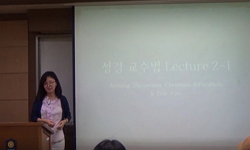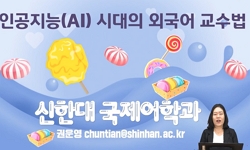Most learners enrolling in writing courses have a desire to write well but often find it challenging to write and have little interest in writing. Therefore, writing instructors should utilize effective instructional methods that help engage learners ...
http://chineseinput.net/에서 pinyin(병음)방식으로 중국어를 변환할 수 있습니다.
변환된 중국어를 복사하여 사용하시면 됩니다.
- 中文 을 입력하시려면 zhongwen을 입력하시고 space를누르시면됩니다.
- 北京 을 입력하시려면 beijing을 입력하시고 space를 누르시면 됩니다.

글쓰기 학습자의 자기효능감 강화 및 실제적 문제 개선을 위한 교수자 피드백 방법 연구 = A Study on the Instructor Feedback for enhancing the self-efficacy and Improvement of practical problems of Writing Class Learners
한글로보기https://www.riss.kr/link?id=A106288843
- 저자
- 발행기관
- 학술지명
- 권호사항
-
발행연도
2019
-
작성언어
-
-
주제어
피드백 ; 자기효능감 ; 멘토링 ; 교수법 ; 첨삭 ; 동기부여 ; 자기소개서 ; 비평문 ; Feedback ; Self-efficacy ; Mentoring ; Teaching Method ; Correction ; Motivation ; Self-introduction ; Critical Essay
-
KDC
700
-
등재정보
KCI등재
-
자료형태
학술저널
- 발행기관 URL
-
수록면
359-385(27쪽)
-
KCI 피인용횟수
1
- DOI식별코드
- 제공처
-
0
상세조회 -
0
다운로드
부가정보
다국어 초록 (Multilingual Abstract)
Instructor feedback is effective in that individual learners’ writing skills and variables are considered to offer appropriate diagnoses and instructions accordingly. That said, as instructors have authority over learners’ grades, learners may feel overwhelmed by the instructor feedback. Thus, instructors need to develop mentoring strategies before sharing their feedback in order to give a positive emotional stimulus to learners, motivate them and facilitate their self-efficacy. Trust-based mentoring enables learners to acquire knowledge and skills fast and enhances their self-efficacy. In that respect, feedback in writing courses combined with mentoring techniques will create synergy effects with feedback and mentoring being functionally integrated.
From the foregoing perspective, this paper discusses a case of applying mentoring techniques to a writing course for effective feedback. However, the analyzed case of a university liberal arts writing course available to entire undergraduates is characterized by substantial individual differences in learners’ writing skills and variables. Nonetheless, the two rounds of feedback utilizing such mentoring techniques as ‘emotional feedback based on learning partnership’ and ‘specific feedback for setting goals and reinforcing practice’ for all learners generated significant results.
Most learners enrolling in writing courses have a desire to write well but often find it challenging to write and have little interest in writing. Therefore, writing instructors should utilize effective instructional methods that help engage learners in writing activities, given their ambivalence over writing. Still, classroom lessons for dozens of learners are unlikely to provide proper instructions and advice for learners. The instructional methods relying solely on classroom lessons are limited in improving learners’ writing skills due to individual difference, which is why instructor feedback is essential in writing courses.
Instructor feedback is effective in that individual learners’ writing skills and variables are considered to offer appropriate diagnoses and instructions accordingly. That said, as instructors have authority over learners’ grades, learners may feel overwhelmed by the instructor feedback. Thus, instructors need to develop mentoring strategies before sharing their feedback in order to give a positive emotional stimulus to learners, motivate them and facilitate their self-efficacy. Trust-based mentoring enables learners to acquire knowledge and skills fast and enhances their self-efficacy. In that respect, feedback in writing courses combined with mentoring techniques will create synergy effects with feedback and mentoring being functionally integrated.
From the foregoing perspective, this paper discusses a case of applying mentoring techniques to a writing course for effective feedback. However, the analyzed case of a university liberal arts writing course available to entire undergraduates is characterized by substantial individual differences in learners’ writing skills and variables. Nonetheless, the two rounds of feedback utilizing such mentoring techniques as ‘emotional feedback based on learning partnership’ and ‘specific feedback for setting goals and reinforcing practice’ for all learners generated significant results.
참고문헌 (Reference)
1 전지니, "학술적 글쓰기의 단계적 피드백 방향 고찰-이화여자대학교 학술 비평 과제의 피드백 사례를 중심으로" 한국교양교육학회 8 (8): 79-112, 2014
2 주민재, "첨삭지도와 수정의 관점에서 고찰한 대학 글쓰기 연구 경향" 국어문학회 56 (56): 423-453, 2014
3 박상민, "첨삭지도에 대한 학습자 요구분석과 효율적인 첨삭지도 방법" 한국작문학회 (13) : 350-380, 2011
4 박영민, "작문 교육론" 역락 2017
5 최종환, "자기서사식 글쓰기 지도에 있어 효과적 피드백 모색 -경희대 후마니타스칼리지 ‘글쓰기1’ 강의사례를 중심으로-" 우리어문학회 (43) : 101-124, 2012
6 구자황, "수정과 피드백이 글쓰기에서 동인(動因)이 되는 방식을 위한 탐구" 어문연구학회 56 : 323-343, 2008
7 김주환, "수사적 맥락에 대한 피드백이 대학생 글쓰기에 미치는 영향―자기소개하는 글쓰기를 중심으로" 한국작문학회 (22) : 9-34, 2014
8 신희선, "멘토링을 통한 대학생 글쓰기 지도 사례연구" 한국작문학회 (11) : 285-323, 2010
9 Brad W. Johnson, "멘토링 황금법칙" 웅진윙스 2016
10 Michael J. Marquardt, "멘토" 이른아침 2006
1 전지니, "학술적 글쓰기의 단계적 피드백 방향 고찰-이화여자대학교 학술 비평 과제의 피드백 사례를 중심으로" 한국교양교육학회 8 (8): 79-112, 2014
2 주민재, "첨삭지도와 수정의 관점에서 고찰한 대학 글쓰기 연구 경향" 국어문학회 56 (56): 423-453, 2014
3 박상민, "첨삭지도에 대한 학습자 요구분석과 효율적인 첨삭지도 방법" 한국작문학회 (13) : 350-380, 2011
4 박영민, "작문 교육론" 역락 2017
5 최종환, "자기서사식 글쓰기 지도에 있어 효과적 피드백 모색 -경희대 후마니타스칼리지 ‘글쓰기1’ 강의사례를 중심으로-" 우리어문학회 (43) : 101-124, 2012
6 구자황, "수정과 피드백이 글쓰기에서 동인(動因)이 되는 방식을 위한 탐구" 어문연구학회 56 : 323-343, 2008
7 김주환, "수사적 맥락에 대한 피드백이 대학생 글쓰기에 미치는 영향―자기소개하는 글쓰기를 중심으로" 한국작문학회 (22) : 9-34, 2014
8 신희선, "멘토링을 통한 대학생 글쓰기 지도 사례연구" 한국작문학회 (11) : 285-323, 2010
9 Brad W. Johnson, "멘토링 황금법칙" 웅진윙스 2016
10 Michael J. Marquardt, "멘토" 이른아침 2006
11 김남미, "대학생을 위한 피드백 활용 다시쓰기 수업의 효과" 한국 리터러시 학회 9 (9): 41-70, 2018
12 정희모, "대학생 글쓰기의 수정 방법에 관한 실험 연구 -자기첨삭, 동료첨삭, 교수첨삭의 효과를 중심으로-" 국어교육학회 (33) : 657-685, 2008
13 이상원, "대학 신입생 글쓰기 능력 평가와 일대일 글쓰기멘토링 사례 연구-의미와 교훈을 중심으로-" 한국사고와표현학회 10 (10): 137-162, 2017
14 김양선, "대학 글쓰기에서 첨삭-상담-고쳐쓰기 연계 교육의 효과 연구 -한림대학교 글쓰기 멘토링 사업의 사례를 중심으로" 한국교양교육학회 6 (6): 377-406, 2012
15 신현규, "대학 글쓰기 첨삭교육의 고찰-중앙대학교 글쓰기 교과목을 중심으로" 한국문화와융합학회 35 : 2013
16 이다운, "대학 글쓰기 수업 학습자를 위한 효율적인 자기소개서 교육 방안 연구: 오류 분석 및 적용 사례를 중심으로" 학습자중심교과교육학회 19 (19): 945-964, 2019
17 이다운, "대학 글쓰기 교재 개편 양상 연구 - 충남대학교 <사고와 표현>을 중심으로" 한국 리터러시 학회 10 (10): 161-196, 2019
18 김낙현, "대학 글쓰기 교육의 효과적인 첨삭지도 방법에 대한 고찰" 한국교양교육학회 6 (6): 323-348, 2012
19 최웅환, "대학 글쓰기 교육에서의 첨삭지도" 한국교양교육학회 7 (7): 331-364, 2013
20 염민호, "대학 ‘글쓰기’ 교과에 활용 가능한 피드백의 특성과 방법" 한국국어교육학회 (83) : 311-336, 2009
21 Jay David Bolte, "글쓰기의 공간" 커뮤니케이션북스 2010
22 박준범, "글쓰기 학습자의 첨삭논평 수용 양상에 관한 고찰" 한국교양교육학회 8 (8): 271-305, 2014
23 지현배, "글쓰기 첨삭지도의 실태와 수강생의 반응 분석-경북대학교 글쓰기 강좌의 경우" 한국리터러시학회 2 : 2011
24 남진숙, "글쓰기 첨삭의 효과적인 교수학습법" 한국사고와표현학회 6 (6): 117-142, 2013
25 박상민, "교수·학습과정에서 글쓰기 피드백 활동의 효율성제고를 위한 연구" 한국사고와표현학회 6 (6): 143-174, 2013
26 이은자, "교사 첨삭 피드백의 원리와 방법" 한국작문학회 (9) : 123-152, 2009
27 심호남, "첨삭을 활용한 글쓰기 수업 모형 연구" 한국 리터러시 학회 (14) : 163-193, 2015
28 Susan M. Brookhart, "How to give effective feedback to your students" ASCD 2008
29 Deirdre Burke, "Giving Students Effective Written Feedback" McGraw-Hill 2010
30 Margo Murray, "Beyond the Myths and Magic of Mentoring: How to Facilitate an Effective Mentoring Process" Jossey-Bass 2001
동일학술지(권/호) 다른 논문
-
정지용 후기 시의 산문성과 무력감 -『白鹿潭』의 재평가와 「슬픈 偶像」의 재해석을 중심으로-
- 우리어문학회
- 박성준
- 2019
- KCI등재
-
백석의 만주 통신(通信) -러시아 작가 바이코프 작품 번역의 의미-
- 우리어문학회
- 이상숙
- 2019
- KCI등재
-
- 우리어문학회
- 장혜진
- 2019
- KCI등재
-
『조선출판경찰월보』 수록 아동 서사물의 검열 양상과 의미
- 우리어문학회
- 문한별
- 2019
- KCI등재
분석정보
인용정보 인용지수 설명보기
학술지 이력
| 연월일 | 이력구분 | 이력상세 | 등재구분 |
|---|---|---|---|
| 2027 | 평가예정 | 재인증평가 신청대상 (재인증) | |
| 2021-01-01 | 평가 | 등재학술지 유지 (재인증) |  |
| 2018-01-01 | 평가 | 등재학술지 유지 (등재유지) |  |
| 2015-01-01 | 평가 | 등재학술지 유지 (등재유지) |  |
| 2011-01-01 | 평가 | 등재학술지 유지 (등재유지) |  |
| 2009-01-01 | 평가 | 등재학술지 유지 (등재유지) |  |
| 2006-01-01 | 평가 | 등재학술지 선정 (등재후보2차) |  |
| 2005-01-01 | 평가 | 등재후보 1차 PASS (등재후보1차) |  |
| 2003-07-01 | 평가 | 등재후보학술지 선정 (신규평가) |  |
학술지 인용정보
| 기준연도 | WOS-KCI 통합IF(2년) | KCIF(2년) | KCIF(3년) |
|---|---|---|---|
| 2016 | 1.03 | 1.03 | 0.83 |
| KCIF(4년) | KCIF(5년) | 중심성지수(3년) | 즉시성지수 |
| 0.93 | 0.96 | 1.437 | 0.46 |




 KISS
KISS






